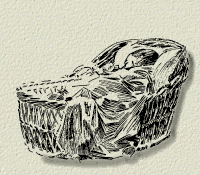The First 5 Years Matter

Y
o u M a k e T h e D i f f e r e n c e !
Research shows that children thrive
if they receive really good attention and care from their parents,
teachers,
and child care providers. But we all know that good parenting,
good education,
and good child care isn't easy; it doesn't just "happen."
So very many things need to be taken care of - each child's health and
safety, each child's need for nutritious food, each child's need for
comfort
and love.
Each of these very basic, crucial needs have to be met
every morning, every afternoon, and every evening of every single
day.
Not an easy matter, but it's definitely what good parents, good
teachers,
and good child care providers work every day to do.Good parents,
good teachers, and good child
care providers take care of children's physical and emotional needs to
the very best of their abilities and they do something else that is
equally
important. They learn how to support each child's intellectual
development
and make a commitment to offer each child age-appropriate educational
experiences
every morning, every afternoon, and every evening of every single day.
Some
age-appropriate educational experiences take less than a minute
to do -
 Place
a well-chosen toy within reach of an infant as you smile and say, "this
is for you" Place
a well-chosen toy within reach of an infant as you smile and say, "this
is for you" Tell a toddler the name of the vegetable on his plate and encourage him
to taste a little
Tell a toddler the name of the vegetable on his plate and encourage him
to taste a little
 Praise a two-year-old for how she stacked "three little blocks on top
of
each other"
Praise a two-year-old for how she stacked "three little blocks on top
of
each other"
 Put the name of a three-year-old on his drawing while he hears you say
his name and watches you write and say each letter of his name
Put the name of a three-year-old on his drawing while he hears you say
his name and watches you write and say each letter of his name
 Give a four-year-old several books to look at while she is in the car,
on the bus, or simply waiting for a meal to be ready - and tell her
the name of each of the books
Give a four-year-old several books to look at while she is in the car,
on the bus, or simply waiting for a meal to be ready - and tell her
the name of each of the books
Some
age-appropriate educational experiences take 5, 10, or 20 minutes to do
-
 Hold
an infant close to you while you feed her, look at her, and talk to her
Hold
an infant close to you while you feed her, look at her, and talk to her
 Change a toddler's diaper while you describe what you are doing and
praise
him for lying still for a few moments
Change a toddler's diaper while you describe what you are doing and
praise
him for lying still for a few moments
 Ask a two-year-old to choose a favorite book to read with you and then
letting him help turn the pages and point to some of the pictures while
you read the words
Ask a two-year-old to choose a favorite book to read with you and then
letting him help turn the pages and point to some of the pictures while
you read the words
 Help a three-year-old with "clean up time," putting each toy back where
it belongs while you and he name the objects and discuss where each one
goes
Help a three-year-old with "clean up time," putting each toy back where
it belongs while you and he name the objects and discuss where each one
goes
 Cook something simple with a four-year-old using a recipe with pictures
while you talk to each other about ingredients, how they look and
taste,
and the sequence of what needs to be done
Cook something simple with a four-year-old using a recipe with pictures
while you talk to each other about ingredients, how they look and
taste,
and the sequence of what needs to be done
 Ask your child to tell you about a picture he drew and write down what
he says word-for-word. Then read it back to him.
Ask your child to tell you about a picture he drew and write down what
he says word-for-word. Then read it back to him.
 Ask
your child to "sound out" the beginning sound of some words in a
familiar book, on a cereal box, or on store sign when you're out
shopping. Ask
your child to "sound out" the beginning sound of some words in a
familiar book, on a cereal box, or on store sign when you're out
shopping.
These
are all things you can do - starting today. And these are all
things
that matter.
Why? Because these types of daily educational
experiences help children understand that spoken words have
meaning.
They help children acquire a large, useful vocabulary. They
encourage
children to try new activities and to be active, confident learners.
They
provide practice with small motor skills and eye-hand
coordination.
They show that printed words have meaning. And they help children
associate books and reading with pleasurable experiences.
All this becomes the foundation for children
learning to read and becoming successful readers.
So just remember - A
little bit each day goes
a long way. And a little bit more each day really adds up!
|

